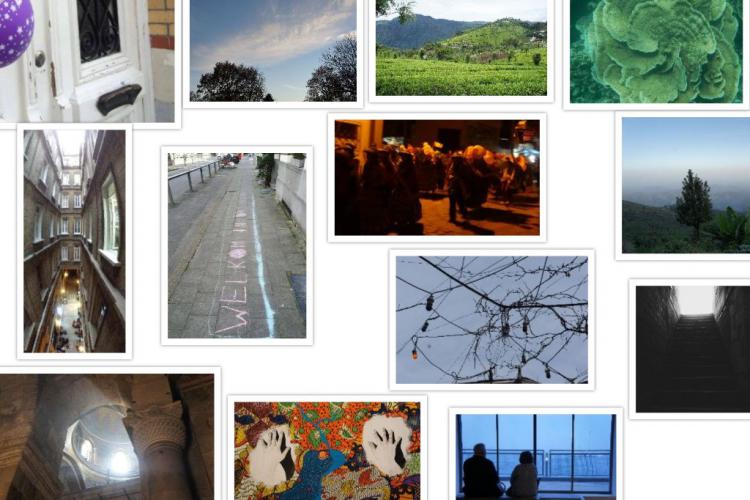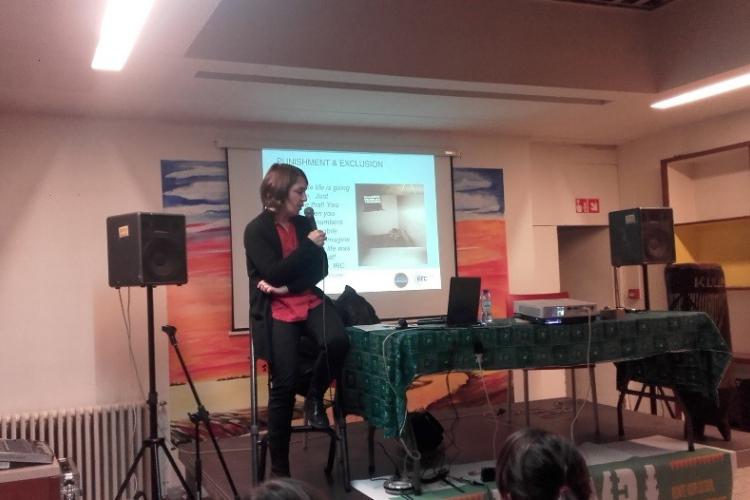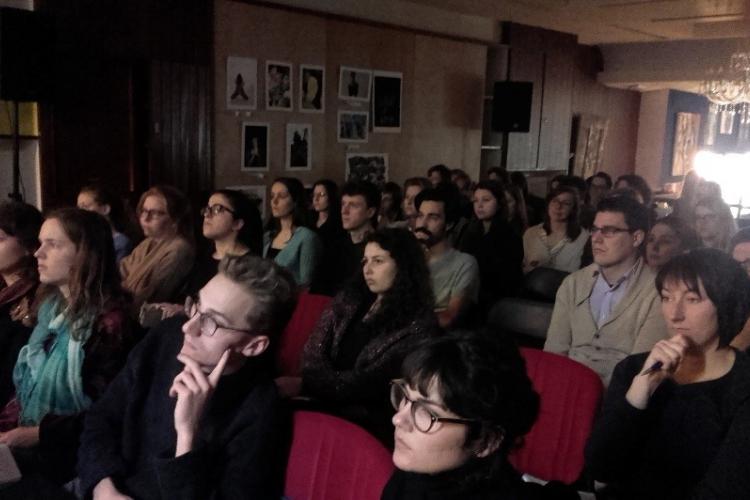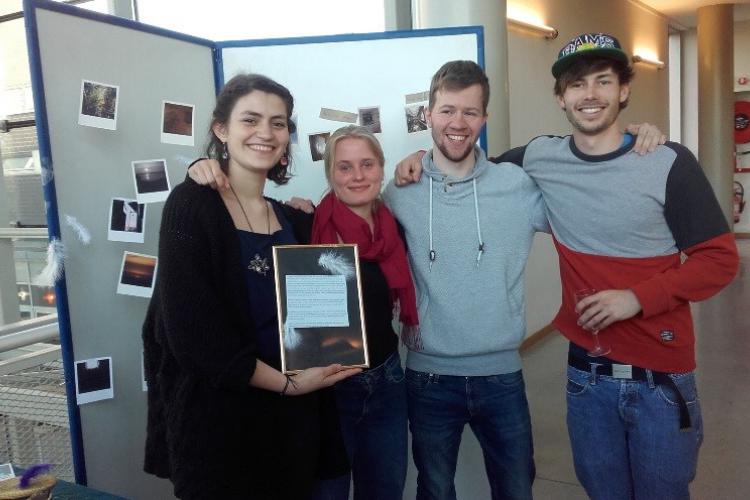‘A Feather Whirling Through the Air’: Working on ‘Immigration Detention’ in a Project-Based Learning Trajectory
Posted:
Time to read:
Guest post by Sophie Withaeckx and Linde Moriau. Sophie is coordinator of RHEA Centre of Expertise on Gender, Diversity and Intersectionality at the Free University Brussels and was until recently student moderator of the course Redelijk Eigenzinnig (2015-2017). She holds a doctorate in Philosophy and Moral Sciences (VUB), and master degrees in African Languages & Cultures (UGent) and International Politics (UA). Previously, she has worked as staff member and coordinator in IVCA (Intercultural Women’s Center Antwerp) and as a researcher and lecturer in Odisee University College. Linde is staff member and student moderator of ‘Redelijk Eigenzinnig’. Before joining Redelijk Eigenzinnig, Linde worked as a teacher of science. She has an MSc in Biology and is trained in intercultural communication. This is the eleventh instalment of Border Criminologies’ themed series on 'Immigration Detention in an Era of Mass Mobility' organised by Mary Bosworth.
Immigration detention has increasingly become a means of managing migration. Nevertheless, research is scarce, as sites of detention are difficult to access. For those academics engaged in research projects and knowledge production on this contentious issue, sharing their expertise with the wider public may be a challenging endeavour. How to reach people and students from a variety of backgrounds? How to sensitise students to the importance of researching ‘difficult’ subjects and learning about the challenges of conducting research in a demanding environment? How to make ‘real’ for them how seemingly abstract laws and discourses on migration impact upon the daily lives of many immigrants?
In this post, we would like to share our experiences on developing a learning project on ‘immigration detention’ with an interdisciplinary group of students. As organisers and moderators of the course we aim to promote participatory learning on socially relevant topics and to stimulate students to reflect critically on the discourses and practices that shape our society. By organizing exchanges between students and academics from different disciplines, between the academy and society, between learners and professionals, the course aims to break down barriers on a variety of levels. We will, first, briefly explain the set-up of the course and how a topic like ‘immigration detention’ came to be included in this year’s curriculum. Second, we will present the results of our project.

Redelijk Eigenzinnig ((Reason & Engage, RE) is a new and experimental optional course at the Free University of Brussels (VUB). Although we provided an English title , a more literal translation sounds more like 'reasonably wilful' 'Redelijk' (Reasonably) stands for the core importance of ‘reason’ in a university that stresses the power of human reason as the most reliable source of knowledge and morality. ‘Eigenzinnig’ could best be translated by ‘wilful’, referring to the VUB-commitment to academic freedom and the refusal to submit critical thinking to any form of dogmatism.
RE was first established in 2015, out of a desire to bring together students, lecturers and researchers across different academic disciplines, to promote interaction and learning and strengthen the university’s connection to Brussels.
The course is set up as a series of lectures and workshops, in which academics and professionals present their work and interact with students and the public. Throughout the year, students work together in small groups following the principles of project-based learning: each group is assigned a ‘problem task’ (designed in collaboration with experts working on the topic) and is asked to formulate research questions and learning goals. At the end of the course, the students present their ‘answers’ to the problem task, in the form of a creative product (e.g. infographic, communication campaign, board game, movie, action plan etc.).
Each year, a central topic, which elicits discussion and merits reflection, is selected. In the 2016-2017, the central topic was 'migration': an obvious choice as migration does not only dominate political agendas, but affects the lives of many – immigrants and non-immigrants alike – that live in what are now called superdiverse societies. With 62% of its inhabitants having an immigration background, Brussels is the second most cosmopolitan city in the world. Moreover, immigration is an interdisciplinary topic that has been discussed and studied from a variety of academic disciplines.
Teaching an interdisciplinary group of students on a topic as vast as migration is in many ways a challenge. Levels of knowledge vary, and so do the methods of learning and teaching that will be used.
However, this diversity can also be considered an asset. Drawing on their divergent backgrounds and perspectives, students can bring in their own experiences and standpoints and gain refreshing insights from their interaction with – for them – unusual interlocutors.
Two sub-topics were also formulated. In the first semester, we focused on causes of migration and intervention in non-Western nation-states. In the second semester, the focus was on ‘citizenship and participation’ of immigrants in Belgium, including issues like, ‘solidarity with undocumented immigrants’, ‘perceptions of immigration in the media’, ‘discrimination on the labour market’ and ‘immigration detention’.
The topic of ‘immigration detention’ was selected for its potential to demonstrate the problematic nature of immigrant ‘citizenship’, and how immigration laws increasingly serve to criminalise rather than to regulate migration. The academic expert on this matter was Professor Mary Bosworth, who through her unique research in immigrant detention centres, was well placed to introduce students to the topic. On the 14th of February 2017, professor Bosworth gave a memorable talk in the lively Brussels’ quarter of Matongé.

An interdisciplinary group of four students – Jozefien Stevens (master adult education), Simon De Backer (master electromechanical engineering), Benjamin Vermeulen (master physical education) en Merel Thijs (master philosophy) – was assigned a ‘problem task’ that focused on the problem of ‘detention of families with children’. Starting out from a real-life situation – the case of a 16-year old girl threatened with detention and expulsion – these students set out to collect information, develop their opinions on the issue, and find a way to share what they learned with a larger audience. Besides attending prof. Bosworth’s lecture, the students consulted the literature and discussed with professionals: in a special working session, employees from Vluchtelingenwerk Vlaanderen (Refugee Work Flanders) and Platform Kinderen op de Vlucht (Platform Refugee Children) shared experiences based on their everyday interactions with parents and children in detention.

The students soon found out that researching this topic is particularly challenging, as detention facilities are often inaccessible to outsiders, and there is hardly any transparency in the procedures followed. In designing their output, the students, therefore, decided to focus upon the feelings evoked by being detained, in order to convey to the wider public the dreams, hopes, fears and uncertainties faced by immigrants in detention. The students presented an exposition of pictures of a variety of landscapes, where people are invited to read the accompanying text below, stimulate their imagination and share their own feelings and reflections.

‘When you see a feather whirling through the air, it speaks to the imagination. A feather alone can, because of its light weight and structure be carried away by the wind for hours. If you’d look at it real closely, you’d see that such a feather is truly ingenious. A feather is designed to offer a bird warmth, protection and the capacity to fly. All the feathers together form an indispensable whole for the bird to survive. On its own, whirling through the air, the feather is much more vulnerable. It is subject to a variety of influences, like rain or even a heavy storm.
With this picture exposition, we want to stimulate your imagination. Which kinds of situation would be beneficial for the feather? Where would you like to float around or let yourself carry away by the wind? In which kind of situation you’d feel free and where would you feel imprisoned?
The numerous feathers in the air contain personal messages of people on the run. You will find some messages and experiences of the different parties involved. Feel free to share your own experience and send it away with the feather!
If you wish so, you can leave a message, experience or wish by writing it on a small paper or attaching it to one of the strings.'
In their reflection report, the students explain how they were touched by the issue and how, throughout the course, they developed their views on the topic:
'At the start of our group work, we had hardly any idea about the situation of children in detention, even less about the return procedure experienced by many children and parents. The topic raised very ambivalent feelings for us, as we felt it touched us personally. This feeling was further triggered by the knowledge we gained throughout our learning trajectory, as we learnt about how the return procedure actually works. The Service for Aliens (Dienst Vreemdelingenzaken) considers the procedure as something very pragmatic, and seems to forget the human part. (…) We found this course a great opportunity to interact with experts and to attend the different activities. It gave us the chance to develop a more nuanced personal view on the topic of migration.'
As moderators, including the topic of ‘immigration detention’ provided an opportunity to open up the discussion on a rather unknown and sensitive aspect of the immigration debate. We warmly thank Professor Bosworth for joining us in the effort, and encourage researchers working on the topic to keep on sharing their knowledge with students and the public from a variety of backgrounds!
Any comments about this post? Get in touch with us! Send us an email, or post a comment here or on Facebook. You can also tweet us.
__________
How to cite this blog post (Harvard style)
Withaeckx, S. and Moriau, L. (2017) ‘A Feather Whirling Through the Air’: Working on ‘Immigration Detention’ in a Project-Based Learning Trajectory. Available at: https://www.law.ox.ac.uk/research-subject-groups/centre-criminology/centreborder-criminologies/blog/2017/06/ (Accessed [date])
Share:








